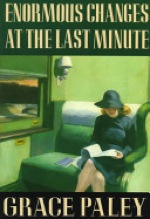
When I can’t remember what a story is, I return to “Wants,” by Grace Paley. A woman returns two books to the library eighteen years late, pays her fine, checks out the same books because it’s been so long since she’s read them, and then runs into her ex-husband. “Hello, my life,” she says to him. The story is three pages long, and Paley makes it contain the entirety of her narrator’s life.
Sometimes she compresses time: “…first, my father was sick that Friday, then the children were born, then I had those Tuesday-night meetings, then the war began.” But she also chooses moments to linger on. When her ex-husband accuses her of wanting nothing, the narrator remembers his habit of “making a narrow remark which, like a plumber’s snake, could work its way through the ear down the throat, halfway to my heart. He would then disappear, leaving me choking with equipment.” Maybe someday I’ll find an image I like better, but this is the best one I’ve read so far. I think of it often.
I’ve taken a lot of creative writing classes, and I can’t count the number of times I’ve heard that the main character has to want something. In “Wants,” the narrator sits right down on the library steps and lists the things she wants. Some are concrete and some are abstract. Some are still possible and some are not. In the end, she returns the library books she’s just checked out. It’s a small gesture of hope, her way of proving to herself that she can take action, but it’s sad, too. She won’t get to reread the books, and so much has changed in her life and in her city since she last read them. It’s a warm story, told with humor, but it also breaks my heart.
Grace Paley had a singular voice, and it would be foolish to try to imitate her. She reminds me, though, that great fiction can be about small moments, and that big themes can come out of these moments (“I had promised my children to end the war before they grew up.”).
The story takes about five minutes to read. The books in question are The House of Mirth and The Children, by Edith Wharton. Not a bad reading list.